#this is strategy analysis not discourse
Text
the reason why red team wins isn’t because they submit tasks last minute. that isn’t even the biggest part of their strategy, so let me tell you what red is doing to win:
delegating tasks: each member has spent most of their time collecting whatever resource the team needs. they work together to come up with specific goals (eg. enchantment table, mining iron, getting string) and then send specific people out to do that task, usually whoever’s free at the moment
helping each other: they would all drop everything at a moment’s notice to help a teammate in trouble
sharing resources: red team shares literally everything they own. most notably, bings and personal quest items
personal tasks: they all help each other out to finish these, and they make sure everyone active gets them done. i think a good chunk of their points come from this category actually, since the other teams don’t seem to prioritize it as much
not seeking fights: ok sure, they’ve gotten in a decent amount of fights, but usually the fight comes to them. they aren’t spending their time searching for people to kill, rather most of their kills have been from running into others in the wild or at spawn (foolish did spend time looking for tina today, but that was mostly looking for blue base as a strategic point)
using time wisely: to kind of add onto the point above, they aren’t spending all their time walking thousands of blocks to others’ bases. they also are very communicative about how much time they have left and what to use it for. they’ll ask how they can help the team with their last ten minutes, for instance
communicating: red team spends almost their entire time on the server in a vc together. I know this isn’t exactly every creator’s thing, but they could still type in chat if they didn’t want to talk. red team have even been leaving discord messages to their teammates to tell them info when they’re not online!
varying their points: i think this is the most important thing tbh. instead of only focusing on tasks or kills, etc. they do a little bit of every. they make sure to do well in every possible point category
being silly: it’s the best part!! the silliness boosts team morale
seriously though, the red team doesn’t just sweep the win at the last minute. if that was true then they wouldn’t log in until the last ten minutes. all the active members spend their 5 hours (or however long they’re playing that day) working on gathering materials and being useful for the team. the only advantage they have from being online later is they know how many points they need to get to catch up. so they can sort of measure how many kills or resources they’d need, etc. but knowing what they need doesn’t guarantee they’ll get it. the red team puts a lot of hard work into their wins it’s not just a cheap sweep. they are clever, resourceful, and strategic
#this is strategy analysis not discourse#i’m analyzing this like it’s a betting sport#it’s FUN#really if the other teams want to win they just need to communicate better that’s the whole point of the event!!#and before anyone comes at me i have been watching all 3 teams#and me saying red team does this doesn’t mean i’m saying the other teams aren’t doing it#i’m just saying this is what red is doing that’s making them WIN#qsmp
546 notes
·
View notes
Text
The U.S. political right wing does not have an answer to climate change. Neither does the technocratic and centrist net-zero discourse, which has failed to achieve adequate reductions, as will become increasingly apparent within just a few years. With no one else driving the agenda, the left needs to offer an alternative, sector-by-sector roadmap for decarbonization. We need to fill the voids in leadership, analysis, planning, organizing, and coalition-building. Rather than focusing on particular technologies, we need to be setting objectives for the areas in which these technologies could be used. If we put forward both best-use cases for CCS and alternatives to CCS, we are more likely to avoid bad CCS projects—and we can play a leading role rather than a defensive one.
[...]
It’s true that we need a robust climate movement to block truly harmful projects that would lock in new fossil fuel infrastructure or violate Indigenous sovereignty, and it is critical to support communities in this work. But it would be a mistake to narrowly focus climate organizing on reenacting successful infrastructure-blocking tactics in ways that fail to discern useful industrial carbon projects from bad ones. Such an approach puts the climate movement into a reactive role just when climate advocates need to be the ones who plan the energy transition. Taking a wider-strategy approach to CCS will take patience. It will require building broader coalitions and organizing in rural areas where a lot of decarbonization needs to happen. It will be challenging—but the cost of being absorbed by the CCS distraction is not one that the movement can afford.
176 notes
·
View notes
Note
for an incredibly new f1 follower, what would you recommend for getting up to date with teams and racers and performances and history? apart from dts lol
oh that is a good question!!! i don't think i'm even the best person to answer this but honestly i think it all comes naturally if you pick a specific thing/team/person you're interested in and set out to learn more about that topic, because everything is so connected and with time you can fill in those knowledge gaps pretty quickly :') more under the cut:
dts is imo perfectly acceptable for learning names and faces for the first time and basically creating a vague outline of a given subject (i've said it's like using duolingo for learning a new language lol), so if you watch it and are like oh—i'm interested in charles or mercedes or learning more about technical regulations or whatever, then you can just dive deeper into that via wiki / youtube / podcasts + published media + old race archives and build up from there!
otherwise i think the main thing is just to start watching the actual races when the season gets underway, and in order to properly appreciate them then also read up on + watch videos about the technical/strategy side of the sport as well. back in the day i used to really like chain bear and i still always recommend it to anyone who asks! after that i would just seek out like... a community/server/place where other people are discussing news real-time; this could be meeting people on tumblr and twitter, but personally i'm subscribed to r/formula1 because it's the most active composite source of f1 news and Discourse. if you're reddit-averse i also just keep a big list on twitter with a bunch of random data accounts, official driver/team accounts, journalists, etc. that helps me keep up with the season in a tidy fashion—though honestly f1 journalism is so unserious that you don't really need to do that because most journos regurgitate the same three quotes in slightly different formats, so if you want to follow One Guy who won't disseminate bs info i'd recommend chris medland. or just general sport publications like autosport, motosport.com, the athletic if you're already subscribed to it (pretty lacking for f1 though since it's american lol), etc... some sites like the-race are very contentious though so i'd say just tread with caution!!! on the data side i personally enjoy fdatanalysis and f1telemetrydata (i've also used f1-tempo to do my own telemetry analysis but idk if that's useful). but again i'd highly recommend the subreddit since it keeps everything i just mentioned in one place anyway 😭
other media recs:
f1tv, if it's available in your area, has pretty much everything you need to follow f1 in its entirety. i hate to shill for paid media but i genuinely think it's good; you can watch every f1, f2, f3 session real-time, as well as go to the archives and revisit old races for each series from most seasons. it also has technical shows and a whole host of minidocs with bite-sized info that are probably less sensationalized than dts. if you don't have f1tv though then a lot of decent content is cross-posted to the f1 youtube so honestly the official channels are all pretty good for keeping up with the sport.
podcasts: if you're an auditory person then podcasts are a great way to deepdive into f1 history. personally i believe that 80% of men running f1 podcasts should be legally barred from ever having an opinion on motorsport, so i don't listen to that many, but i do enjoy the official f1 podcast beyond the grid (i listen to it on spotify but you can also find full transcripts on the f1 site) since, you know, they get official personnel on and i appreciate the wide range of personalities interviewed—from drivers to tps to various types of engineers. i've also heard good things about shift+f1, the race, and engine braking, but i haven't checked them out so i'd recommend just looking podcasts up yourself and seeing what vibes with you! though some podcasts are just like... I'll eat this because you're interviewing my guy but i would never watch/listen to you otherwise. (cough pit stop...)
books & autobiographies: again if you want to dive more into old f1, then you can always read a book!! i read jenson's autobiography life to the limit earlier and was very endeared, it's a super breezy but charming read ❤️ adrian newey's memoir is also a decent overview of a clearly brilliant and accomplished mind, i enjoyed the technical details and found his early career path especially interesting.
docus, movies, tv: there's also plenty of f1 media outside of f1tv, so you can always check those out; f1 movies aren't necessarily that accurate or frankly good but sometimes it's fun just for the Vibes and the love of the sport. for ex rush (2013) covers james hunt & niki lauda's rivalry, netflix has a schumacher (2021) doc, the brawn gp miniseries ft. jense came out last november, just things like that... some current individual drivers also have their own random miniseries so you can always seek those out, for ex i watched maxv's anatomy of a champion the other day just for the fun of it LOL.
i don't know whether any of this is helpful... but maybe other people can reply with their own recommendations!!!
also if you're interested in f2, f3, etc. then honestly just follow feeder series on whatever platform since they cover everything pretty well; feeder_series on twitter, r/f1feederseries, plus they do interview podcasts on youtube/spotify so i like watching those to keep up with young drivers. you can also watch chasing the dream for succinct f2 narratives; it used to only be on f1tv but it gets uploaded on youtube now so it's fairly accessible. lmk if you have any other questions or something specific you'd like more info about!!!
34 notes
·
View notes
Text
The Validity of Jin Guangyao’s Lookout Towers
There’s been a lot of discourse for a while about the validity of the lookout towers that Jin Guangyao builds in his capacity as Chief Cultivator: whether or not they were a good or bad thing, whether they helped civilians or not, and what the real motivation behind building them was. I’ll be going over my thoughts on these lookout towers, using quotes from the exr, fanyiyi, and boat-full-of-lotus pods translations as well as a translated snippet from @jiangwanyinscatmom for every instance the lookout towers are mentioned in the story. Be warned that with this in mind, this will get long. Analysis under the cut:
The first time the reader is introduced to the concept of the lookout towers is in Chapter 42 (Flora X for fanyiyi, Grasses for exr). Wangxian and the junior disciples had just escaped Yi City, and Wei Wuxian is lamenting the fact that lookout towers (which he had seen along their path and which Lan Wangji explained the purpose of to him) were not built anywhere near the city. This is the explanation for their building provided by the 3rd POV narrator:
These “lookout towers” were distributed across distant, desolate locations, and disciples were chosen from each clan and posted to them. If something strange appeared, they were to act immediately. In the event that they couldn’t solve the problem on their own, they were supposed to promptly request help from other clans or wandering cultivators. In the event that the cultivators who answered the call asked for compensation, the funds the Lanling Jin Clan raised each year were enough to cover it in spite of the locals’ inability to bear the financial burden.
–fanyiyi
These “lookout towers” were scattered around the more remote places. Every one of them were assigned disciples from certain sects. If anything strange happened, they’d take action at once. When they couldn’t deal with the matter, they’d send out messages to other sects or rogue cultivators for help. Even if the cultivators who came wanted something in return while the locals were too poor to give them any, the money that the LanlingJin Sect gathered throughout each year would be enough to support them.
–exr
However, before they were built, they were met with a lot of resistance and backlash:
After Jin Guangyao had officially succeeded Jin Guangshan as Clan Chief and risen to the position of Chief Cultivator, he had begun gathering and deploying personnel and resources from each clan, putting his hand to the task of realizing his earlier plan. Immediately, he was met by a wave of resistance; many suspected the Lanling Jin Clan of using the project as a pretext to stuff their own pockets and seize more power. Jin Guangyao plastered a smile on his face and spent five full years grinding down the opposition. In that time, he made a countless number of alliances, and a countless number of enemies. After much coaxing with the carrot, prodding with the stick, and generally deploying every strategy at his disposal, he finally prevailed. Over one thousand two hundred “lookout towers” went up throughout the land...
...All of this occurred after the death of the Yiling Laozu. Wei Wuxian had only gotten the whole story from Lan Wangji after the two had passed a few lookout towers during their journey. He had heard reports that Jinlin Terrace1 was preparing to build a second round of lookout towers, expanding the number to three thousand and covering an even greater area. After the existing set of lookout towers had been built, their effectiveness garnered them widespread approval, but nonetheless, the sounds of doubt and ridicule had never abated.
–fanyiyi
After Jin GuangYao officially succeeded the position of Sect Leader and became the Chief Cultivator, he immediately gathered people and resources from the sects, and started to carry out his past goals. In the beginning, the voices of opposition were deafening. A lot of people suspected that the LanlingJin Sect used it to gain personal benefits and stuff its own pockets. With a smiling face, Jin GuangYao persisted for five years. During the years, he allied but also fell out with countless people. Using both gentle and forceful methods, he did all that he could and what he wished for was finally completed. More than twelve hundred “lookout towers” had been built...
...All of these happened after the death of the YiLing Patriarch. Wei WuXian only heard the ins and outs from Lan WangJi after they passed a few lookout towers during their journey. Rumors had it that Koi Tower was preparing to build the next batch of lookout towers, increasing them to three thousand in number so that they covered a greater area. Although after the first lookout towers were built, they received widespread approvals due to their notable effects, the voices of suspicion and ridicule had never died either. When the time came, the cultivation world would definitely be thrown into chaos again.
–exr
The backlash was specifically because Jin Guangyao was “gathering and deploying personnel and resources from each clan” (fanyiyi). Yet, the opposition is eventually suppressed enough to proceed with construction after 5 years. How so? Well the 3rd POV narrator explains once again:
Back then, in order to build the lookout towers, Jin GuangYao not only faced quite a number of opposers, but also displeased a handful of sects. One of the opposing sect’s leaders lost the arguments, and went into a murderous rage, killing Jin GuangYao and Qin Su’s only son. The boy had always been a good child and he couple had always loved him dearly. Under resentment, Jin GuangYao tore down the entire sect in revenge.
–Chapt. 47: Guile, exr
An opposing clan leader killed Jin Rusong, Jin Guangyao’s son, and Jin Guangyao massacred the entire clan in retaliation. This is the second time the lookout towers are mentioned in the text, and this gives a more detailed explanation on exactly what “forceful methods” (exr) Jin Guangyao used at his disposal to push his plans through. The next time we hear about the lookout towers, it is very briefly mentioned in Chapt. 49: Guile (exr) where Jin Guangyao is seen through Empathy discussing the blueprints with Lan Xichen, and the last time they are ever mentioned is in Chapt. 86: Loyalty (exr, boat-full-of-lotus-pods, and @/jiangwanyinscatmom segment) when the clans gather at Lotus Pier following the failed second siege of the Burial Mounds to discuss Jin Guangyao’s treachery.
So first question: did the lookout towers create a positive change for civilians? From the little we are told, “their effectiveness garnered them widespread approval“ (fanyiyi) / “they received widespread approvals due to their notable effects“ (exr), so on the surface, yes. But we don’t actually see this approval or effectiveness in the story. For all that the lookout towers were meant to cover cultivator-less areas, remote places like Yi City* were still left untouched by their sights. On top of that, the previous system of night-hunting was that areas would be overseen by local cultivation families. Yi City became a blindspot partially because the Chang clan–the nearest cultivation family–had already been wiped out, and none other had come to replace them.
Futhermore, cultivators–particularly those from the big clans–were notorious for turning away night-hunts that they felt would not bring them glory, would not pay well, or were too troublesome (On Yi City: ”These places were usually located in relatively remote areas, beyond the control of cultivators. Of course, cultivators didn’t want to deal with them either, as doing so was extremely troublesome, even worse than dealing with an aquatic abyss.” chapt. 33, fanyiyi). In a perfect world, cultivators would pick up any task, but in the world of mdzs pre-Wei Wuxian’s resurrection, only Lan Wangji accepts any night-hunt with no compensation, hence his title of Hanguang-jun. As for the pay: well, the explanation says that if locals cannot afford the cultivators’ fees, the Jin would pay for it with “the funds the Lanling Jin Clan raised,” which remember: the Jin are using the resources of other clans to fund the lookout towers. Those clans would, therefore, still be footing the bill in a roundabout way. At best, the effects of the lookout towers are nebulous as, essentially, nothing has actually changed under this system: remote areas are still unprotected, cultivators can still refuse night-hunts they don’t like, and clans will still have to foot the bill for locals who can’t afford their fees.
Second question: was the building of the lookout towers a categorically good thing? I say no. The problem wasn’t that the idea was bad, but the execution of it was paid in blood. Jin Rusong was used as a convenient pawn to excuse Jin Guangyao’s slaughter of his political opponents. Clan Leader Yao (for once) makes the connection perfectly in Chapt. 86:
Sect Leader Yao continued, “And the one who killed Jin RuSong just happened to be the sect leader who opposed his construction of the lookout towers—how could there be such a coincidence?” He snorted, “Either way, no matter what, Jin GuangYao didn’t need to keep a son who’d likely turn out to be an idiot. He killed Jin RuSong, framed the sect leader who opposed him, and crusaded against sects that refused to accept him fair and square, in the name of revenge for his son—although it was heartless, it killed two birds with one stone. What tactics, LianFang-Zun!”
–exr
Sect Leader Yao continued, “Plus, the one who supposedly murdered Jin RuSong also just so happened to be the sect leader in opposition of Jin GuangYao building the lookout towers. Isn’t that too much of a coincidence?” He smirked, “Either way, there was very little reason for Jin GuangYao to keep a stunted offspring. He’d be much better off having Jin RuSong killed and framing it on an opposing sect leader. That way he could use justice and revenge as excuse to prosecute the sect that he could not tame. It’s a cruel yet very efficient method, getting rid of two birds with one stone. LianFang-Zun is a brilliant manipulator!”
–boat-full-of-lotus-pods
Master Yao continued, “And at the time, the person who poisoned Jin Rusong happened to be the leader of the clan who opposed Jin Guangyao's watchtowers. Can there be such a coincidence?" He sneered, "Anyway, no matter what, Jin Guangyao didn't need to keep a son who was likely to be an idiot. Kill Jin Rusong, kill the leader who opposed him, and then in the name of avenging his son, he justly kills that family who did not accept his rule. Although ruthless, it kills two birds with one stone. What a strategy Lianfeng-zun!"
–@/jiangwanyinscatmom
Jin Guangyao was specifically being opposed for how he was commandeering the disciples and resources of other clans while claiming to be putting the Jin Clan’s resources on the line. Meanwhile behind the scenes, he was scheming for ways to get rid of detractors and landed on using his son’s murder as the catalyst. (A murder which he admits to: “Jin GuangYao easily read what his eyes meant, laughing out of anger, ‘Lan XiChen! In this life, I’ve lied countless times, killed countless times. Like you said, I killed my father, my brother, my wife, my son...’” Chapt. 108, exr)
@/jiangwanyinscatmom’s translation even makes clear the distinction that what Jin Guangyao was being opposed on was not the lookout towers, themselves, but the massive overreach of power by which Jin Guangyao was allowed to commandeer the other clans or wipe them from the planet at his own whim and discretion. And he would have been planning for this for a long time, as he entangled Lan Xichen into his plans for the lookout towers (remember that very brief flashback) and then pulled him into grieving for his son, thereby gaining the approval of at least one other great clan to do as he pleased on this matter. If this was to truly be considered a good project, it should not have been accomplished by such underhanded and bloody means.
And my last question: if not to help civilians, then what was the motivation behind the lookout towers? Well Jin “rapist of sex workers” Guangyao, Jin “instigator of multiple clan and sex worker massacres” Guangyao, Jin “knew about the massacre of Yi City but kept it under wraps to save face” Guangyao does not care about civilians, so we can definitely cross that out. Looking at the evidence still in Chapt. 86, a few pages down from Clan Leader Yao’s explanation, we get this:
“I’ll say a secret too. The money and resources he used to build the lookout towers were all collected from other sects, right? Every sect helped out a bit. I heard that he secretly takes... this amount.”
“Oh Heavens... So much? He really is shameless. I thought he really wanted do good back then. All of our sincerity was fed to the dogs!”
Wei WuXian felt that things were rather comical, If they’re rumors, why the hurry to believe them? If they’re secrets, why would you come to know them?
These rumors didn’t happen in just the one day. However, in the past, when Jin GuangYao was popular, they were suppressed quite well. Almost nobody took them seriously. Yet, tonight, all of the rumors seemed to have become absolute truths, forming the rocks and bricks of Jin GuangYao’s supposedly-committed crimes, proving his lack of morality.
–exr
“Let me share a secret as well then. The money and resources needed to build those lookout towers of his were all gathered from other sects, right? Each sec would receive the portions they’ve contributed, but I’ve heard that he’d actually retain for himself…… this much.”
“Oh Heavens…… that much? How shameless! And here I thought he was honestly trying to do things with them. We’ve been feeding our devotions to the dogs!”
Wei WuXian found this all to be quite amusing. He mused in his heart, ‘If you know it’s only rumors, then why believe it without question? If it’s really a secret, then how did you come to know about it?’
None of these rumors were fresh or new. While the tides had favoured Jin GuangYao, they were effectively contained, and no one really believed them to be true. Yet, in the span of one night, it was as if all the rumors had suddenly become solid evidence, and one by one they became the cornerstone foundation to Jin GuangYao’s tower of sins; proof of his madness.
–boat-full-of-lotus-pods
Jin Guangyao was using the lookout towers as a test run to see how far he could stretch his newfound power as Chief Cultivator, a running theme for all of the previous chief cultivators in the novel (Wen Ruohan and the indoctrination camp escalating into the supervision offices escalating into flat-out war, Jin Guangshan and the Wen labor camp at Qiongqi Path run by the Jin Clan but employing disciples of other clans escalating into the Nightless City banquet and first siege of the Burial Mounds). Can Jin Guangyao as Chief Cultivator command other clans’ disciples without need of permission from their leaders? Yes. Can he seize other clans’ money and resources for his own expenditures? Yes. Can he annihilate clans without any pushback? Yes.
But I also want to draw attention to my bolded emphasis on not only the explanation but also the little chunk of text at the end of the quote. Before that segment, Wei Wuxian (rightfully) points out that these nameless cultivators are running with rumors as truth, the same way they had run with rumors to justify murdering him 13 years prior and accusing him of kidnapping the junior disciples just that day at the second siege. This is a fair observation to make, but the 3rd POV narrator (bolded) swiftly comes in to cap any sympathy that may have begun budding for our fallen villain by telling us what Wei Wuxian does not know: these rumors have existed from the moment Jin Guangyao seized power and began to test his boundaries; it’s just that Jin Guangyao had the power to suppress them before. Now that he has been dethroned and relegated back to “son of a whore,” there is nothing stopping people from recalling the opposition that had always been levied against him from the very beginning. There is nothing stopping them from tearing down the reputation he built in blood.
So there you have it, folks: everything mdzs has to say on Jin Guangyao’s lookout towers, with a little analysis by me on how I think we are meant to view their role in the story. Hope you enjoyed!
*Note: The lookout towers were built after Xue Yang had been expelled from the Jin Clan, but Jin Guangyao still kept an eye on him, as evidenced by the fact that Su She knew where to find him and that yin tiger tally was with him in Yi City. Yi City was sacrificed to Xue Yang to uphold Jin Guangyao’s reputation and hide away his dirty secrets from being exposed.
#human reads mdzs: take 2#human metas mxtx#holy shit this was a long one#but no way around it#i also have another translation that i ended up not using#because it had a huge discrepancy that didn't match the others#like they just missed a section so the rest didn't make sense#so it didn't get added#but special thanks to jiangwanyinscatmom for helping me out of that bind#cause I wouldn’t have made this without clarification otherwise
150 notes
·
View notes
Note
(regarding the Hilton article that you were sent by that anon)
Hilton’s "criticism" is so frustrating because my favorite thing about the Strike novels is that the crimes the team are investigating are not treated as crazy one-offs, but as single *instances* of more frequent problems, and so of course on the way to uncovering one truth, they uncover several. Similarly, the act of investigating those single instances will bring up similar circumstances from characters’ pasts, because again, they are not entirely infrequent occurrences.
But what also shocks me is that this particular criticism ("How dare the world not be split into good decent people and The Criminal!") is the perfect opposite of the criticism everyone loves to return to with Harry Potter ("How dare she write a book where there are Good Guys and Bad Guys"). Of course, actually reading HP will show that the books aren’t so clear cut, but they are still children’s books which tackle good vs evil.
So which one is it? Does Rowling write books with painfully black-and-white views of the world, or does she need to be reminded that only one person can be evil at a time, and the morally perfect heroes must defeat him before someone else can take the reigns? Do we want more variation and imperfection and bad-people-on-both-sides or less?
Well there are two things you have to consider in order to answer your question.
Number one, most if not all criticism thrown at JK Rowling since 2020 has to be read as bad faith because, 9 times out of 10, it's motivated by ideology rather than an actual desire to engage intellectually with the text. It doesn't matter if the criticism makes sense or constitutes rigourous analysis, what matters is how much criticism gets thrown out there. If there are enough articles titled "10 Reasons Why Harry Potter Is Actually Terrible For Children", most people won't read the articles, but they will eventually get a sense that Harry Potter MUST be wrong for children to generate so much controversy. The goal is to discredit JKR's opinions by any mean necessary. That's why Pink News's strategy in June 2020 (following Jo publishing her essay on self-identification) was to publish multiple "articles" a day attacking her and her positions.
Number two: i've read a lot of bad faith "criticism" of JKR and HP over the years (long before 2020). This thing you're talking about - accusing her of promoting black and white morality in HP - is mostly no longer "fashionable" discourse. At its height, it was only ever promoted by, ahem, let's call them "passionate" fans of Slytherin. Context: the marketing strategy of Harry Potter (especially post-release) heavily relies on encouraging fans to pick one of the four houses and identify with it. The problem with that marketing strategy is, to sumrise, no Slytherin is supposed to be a good guy in HP (because the way the "recruits" are picked is based on a racist/classist premise), and there is no real redemption arc for any of the Slytherins kids we see in the books, so some fans eventually started to resent that and became mad at JKR for not just… redeeming Draco and making him Harry's best friend or or whatever. Honestly the psychology behind this particular outrage and why so many people rallied behind it against Rowling ever since the 2000s is fascinating and could easily make for an entire post on its own. But, not the point of this reply!
In short: it was always a very niche criticism from a very petty and nerdy side of the fandom. And nowadays, that specific subset has by and large decided that engaging AT ALL with Harry Potter would make them a Bad Person™. So they no longer protest that specific, perceived issue, because that would mean admitting they care about HP in the first place. They have moved towards basically saying that JKR's morals IN GENERAL are wrong, so if you read her books (which you shouldn't!!) every good guy should be seen as bad (or badly written) and vice versa. This is the reasoning behind people calling for an entire "rewriting" of the books by anyone else, preferably multiple people, or aggressively pursuing the building of a "counter" HP universe, via fanfiction.
Which, again, is really interesting to me from a psychological perspective! This need not to simply erase, but rewrite JKR's work in the "correct" way. The only reason one would feel the need to do that if if they perceived the original work to have so much resonance, so much power, that it can't just be left to be forgotten, because it will NOT fade on its own. Instead you have to rewrite it to confuse future readers, to "drown" the original work essentially under a pile of bullshit. It is not a goal one would ever pursue so relentlessly if they perceived the writing to be bad – wrong, maybe, but not bad. On the contrary it's probably the highest compliment to Jo's writing skills that people feel so threatened by her and the longetivity of her work.
15 notes
·
View notes
Note
why do radical leftists moralize about people who join the US military? the socdems who blame propaganda/ideology and economic anxiety are correct, they seem less liberal to me than those (seemingly everyone on the far left) who believe that said people are simply "evil"
hm, I think it depends:
people don't believe things purely based on evidence or analysis but because it fits within frameworks they already believe or because it is rhetorically powerful. (this is the root of like 95% of all Twitblr left-wing discourse; the loudest voices, by virtue of being on social media, are going to be incurious and inflammatory, the ones who buy in the most to the platform's incentives.) I would argue that broadly, even the socdems you are aligning yourself with here still aren't basing their position necessarily on reality but because it aligns with preexisting beliefs about political strategy.
relatedly, there are different modes of talking about things. like, if you are trying to think through complexity, sometimes you might talk about the United States as a geopolitical entity and the role of the USD. if you are trying to piss someone off or make a joke or signal to someone a broader political affiliation, you might whip out the old "America Delenda Est." I do think each has their place in political discourse, it's just that one shouldn't be mistaken for the other.
it might not be "right" to describe people joining the military as evil but to me, there is definitely a perversity to the trade-off of joining the military in order to get an economic leg up. we might be conscious that capitalists exist within a complicated web of incentives and pressures but I don't think that makes it impossible to ethically evaluate them or their role in that web even if that shouldn't be our main avenue of understanding how the world works. likewise, while it's useful to examine the causes of what makes people join the US military, that military remains a massive engine of global destruction and death, and a breeding ground for reactionary movements, interpersonal violence, and harmful institutions. I am not exceedingly, or at least automatically, sympathetic to people that voluntarily decide to become one of its many cogs. I also think we exist in a culture that still loudly, vulgarly venerates American military strength as the truest representation of power and virtue, and there is some utility in being a provocateur that thumbs their nose at that kind of thing.
12 notes
·
View notes
Text
“The reception of Marriott’s On Black Men is emblematic both of the importance of the issue of Black masculinity in contemporary African American theory and of the conflicting interpretations it gives rise to. Just seeing the title on the book’s cover, confessed Zakiyyah Iman Jackson, immediately made her uneasy. But her concern quickly turned into relief once she discovered that “Marriott’s work offers important contributions to queer of color theory and to black feminism.”[8] The measure of relevance of a work focusing on Black men, then, has more to do with the way it supports other political and demographic groups than with its penetrating analysis of the subject at hand, a subject that provoked an initial unease that few denied. The Afropessimist critic Jared Sexton falls victim to this same view: “Jackson’s generative reading of Marriott’s work is a paradigm case for the potential of research on black men and masculinity to contribute usefully to the project of black feminism and queer theory.”[9] It seems self-evident that, within Afropessimist thought, the discourse of and about Black men shouldn’t be treated as an end in and of itself but essentially as a means to another end. Analyzing their condition serves to shed light on all other situations except theirs. Here we find the formula of an argumentative strategy described by Tommy Curry, according to which “the only hope for Black men and boys lies in reformulating Black masculinity toward a Black feminist ethics.”[10] Therein lies the key to their redemption.”
Norman Ajari - Darkening Blackness: Race, Gender, Class, and Pessimism in 21st-Century Black Thought (2023: 68-69)
3 notes
·
View notes
Text
Death Note: Another Note (revisited)ー An in-depth analysis
*
Everything I don't go over concerning Misora or L is already documented here.
Definitely interesting how Ryuzaki isn't listed as an additional character. Strange and dangerous choice but okay
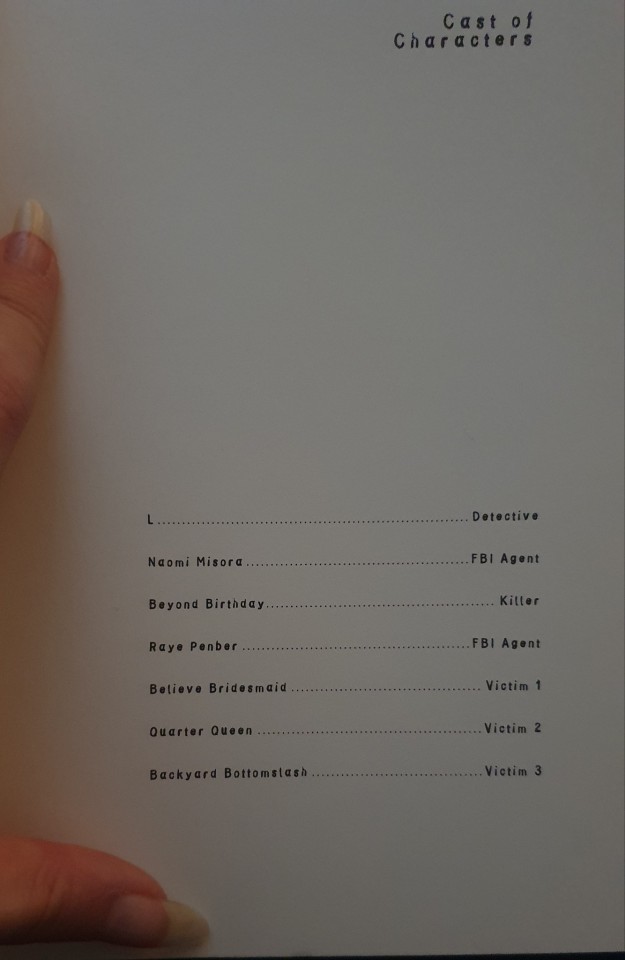
And a VERY intense opening line. God I fucking love the concept of BB.
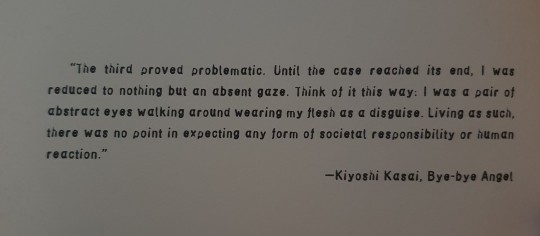
This paragraph actually makes him seem more obscure than I assume most fans who portray him make him out to be. I like to think this isn't just intended for B's Ryuzaki persona but his entire life up to the point of the case's end, as the one untainted glance we get of 'B' apart from his motive. ("Bye-bye Angel" too. Was that intentional?)
Mello sounding like the bastardization of a christian mom when explaining "the difference between the Almighty and a shinigami"
Mihael "best dresser that died like a dog" Keehl. Hand to our hearts
I'm not even going to bother with setting up theories about how Mello even knew what Misora was doing before L first reached out to her or why L would've bothered to tell him, so, alas, it's just a book. It's a book and it needs basic story telling. But actually, making Mello the narrator sets up many plot holes which I'll probably refrain from pointing out. But you can just tell a story like it's a thing... You had your chance to expand on Mello, now it's the biker chick's turn. Just let it be a novel,
Beyond bby most people don't usually look at impersonal strategy murder and assume the least scandalous part of it/the victim's names as worthy title, sweety honeybee babygirl booboobear (ok i'm done..except probably not, prepare for more ahead)

(jk i'm aware he tried to plaster "BB" all over the case, not just the names. It does make sense that the media don't care about things like that, though)
Side note that I can't understand why they created a whole new character and then outright stated 'we won't tell you jack shit about them' (except then go on to do just that. Thanks, Mello)
Wait! L calls her sama.... (also bothered to do her the honors of tending to her background. Create that comfortable work enviroment, king)
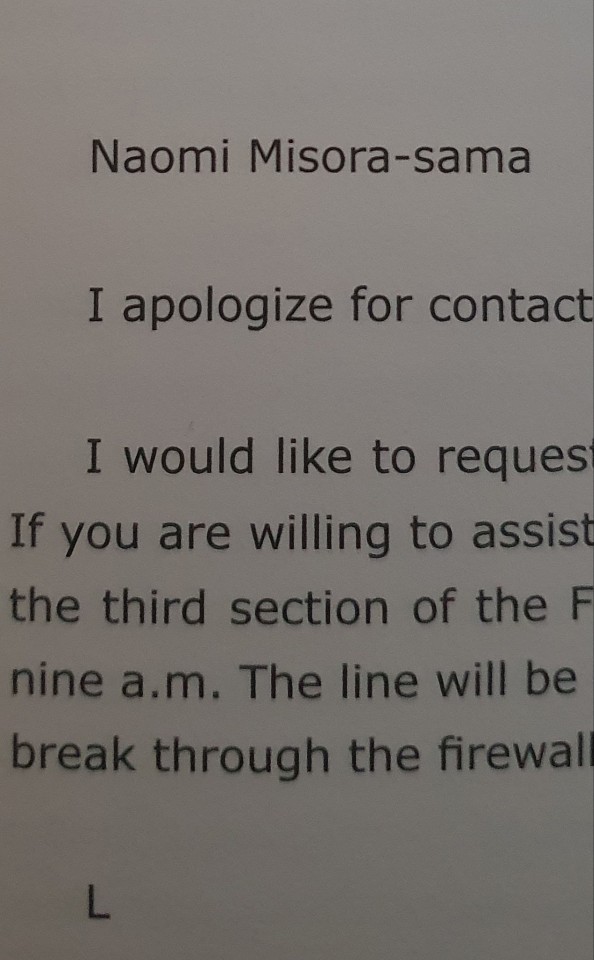

B drugging all his victims before killing them could indicate several things: 1. He wanted to show off his smarts & resources, 2. It was one of several hints that the killings were purely strategic and no act of passion (like not cutting through the shirt, the locked room decision etc.), 3. That B is not a fighter. He didn't want to get into physical altercations with the victims, which could just as well mean that he simply didn't trust himself with such a task (we know that he, in fact, can fight somewhat, so that's either a shred-of-respect thing or strict perfectionism)
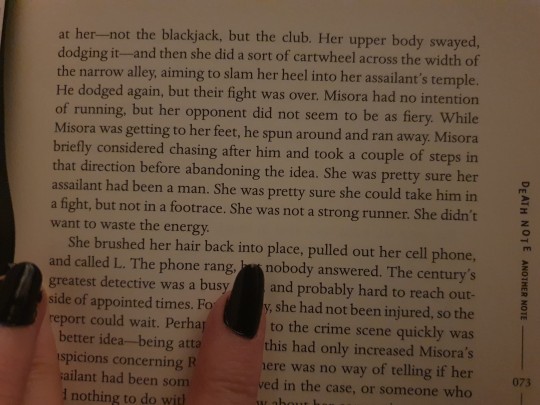
ALTHOUGH... Beyond is more skilled with weapons than muscle, taking a heavy bat (that he only utilizes when Misora proves a fierce opponent, swings it once and then retreats) and blackjack to ambush Misora. It could've been a caution move to not be in danger of having his mask undone in close combat but he seems a good dodger and rather quick on foot, making more sense of why he used clean, non-taxing methods of murder like stabbing or asphyxiation with a rope.
I'm actually going to encourage discourse about the intensive cleaning of crime scenes in the comments. People headcanon that B has OCD but it's more likely that it's another attempt at appearing "abnormal". It's a pretty large and extensive effort to clean every surface of an entire home, which makes this cleaning-impulse-picture Beyond tries to paint a more forged-seeming one. He also did not clean the blood at Backyard Bottomslash's scene, instead moving around it. The contradictionー if or if not intentionalー is kinda funny, I'll give him that. We need more 'overly committed but tired' Beyond (just noticed what i did with this one in particular..)
Man, i adore him.
L, too. Funny man, busy schedule.
Mello is like "I'll save the stories of this dead individual for another time" and it's his testament
Beyond saying this line actually heightens the likelihood of his generally clumsy pretense skills severely. There's absolutely no rhyme or reason as to why he'd respond this way apart from maybe seeming non-threatening, except this line would go completely against its very purpose, creating a double-negative & making him seem more dubious.. Or. He just doesn't give a fuck

L asking the question "was he cool?", by the way, is solely based off of the assumption that B trying to make himself look as freakish as possible would lead to him showing up as a caricature of him to steer the yoke L would send to where he needs them. It is not far-fetched, considering the 'LABB' choice, yet is still quite daring, which we should appreciate as a peak comedy moment in my opinion. I mean L could've just sent a guy to where Misora said they'd investigate next to arrest Beyond but he largely wanted the final room to prove B would lock himself in and also..maybe he thougt it was funny. Just a little bit. Swallowing his pride for the guy his position in the world traumatized to the point where he's planning suicide as part of a revenge act made L steer just a little bit in direction of "alright, let him do his thing". Anyway BB is hilarious and Misora is, unfortunately, obtuse due to avarage mental wellness. L is noticeably anxious but I know they flock at humor.
We have page 69 and the first pages of Opposition, which do the analyzing of other matters for me (everyone). And to be transparent: Good on you, canon, for pointing it out or whatever, but also... Fuck you-
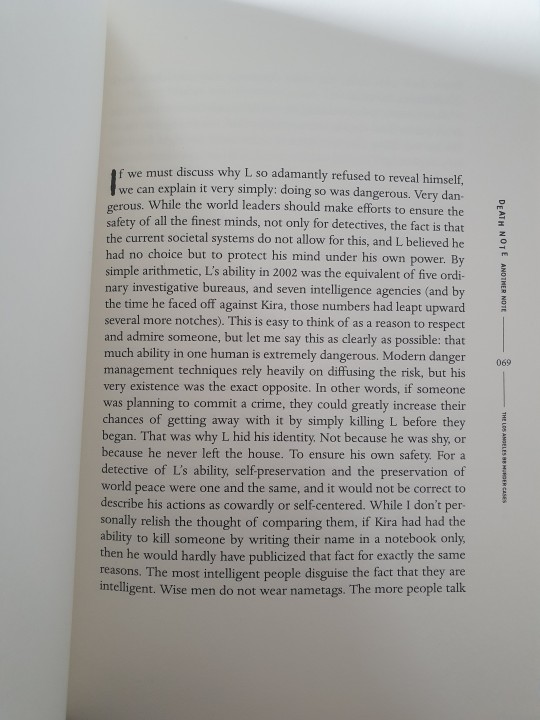
From this point on throughout the main chunk of the book it can only be said that B relies exclusively on the fact that Misora does not tell L closer details of the investigation. It's quite impressive how safe he feels to even outright lead the investigation, even showing up with a pretty much unattainable copy of the crossword puzzle, knowing all books and patternless numbers by heart and even mentioning Misora's capoeira (P.138) although never having seen her practice it as Ryuzaki and instead knowing about it from the back-alley incident. Yeah. Also showing up pretentious & arrogant af and more power to him in all honesty
Alright, let's get to the promised practical stuff. Time to rant a bit about how LABB is written, because it would've been vastly better off without Mello as an all-knowing narrator. It makes the plot so obvious it's not even clear if they're trying to hide Ryuzaki's identity or not, since there's a big paragraph dedicated to explaining the connections given at the very end like it had been a secret. It's messy. It's not satisfying. The reverse psychology doesn't hit. But let's get to the thumb turn lock lock picking...
There are a couple ways to pick a thumb turn lock, in opposition to its key-only counterpart, making it less safe in mathematical terms of chance. The technique used by B, though, involved no pins or metal sticks to shove into its innards.
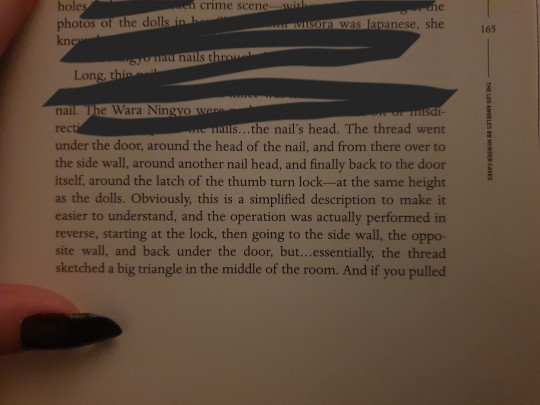
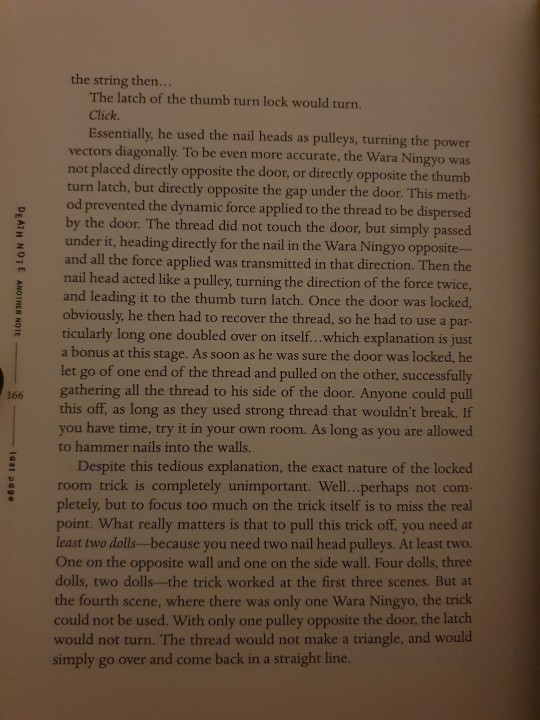
So... is this "simplified description to make it easier to understand" actually sensical?
Well, using even more words to disect this is unfortunate but here we are.
First off: I do not know how a nail with a full doll nailed to it can be "directly opposite the gap under the door". How large is the gap below that door for the thread to 'not touch it'? The explanation it comes with makes sense but the amounts of times Misora mentions that a "hole in the wall is waist-high" or 'across from the door handle' can be confusing. Thing is, the Wara Ningyo are nailed to different walls of the room. Granted, Mello doesn't say what kind of triangle the thread would form, but geometry jokes aside this whole set-up makes everything fall apart slightly for reasons to follow.
I believe what makes it so difficult to understand is that, by logic of this text, the doll at the east/west wall in relation to the door was ground-level in contrary to the one on the north wall, which was latch-level. This is weird though, as it would have pulled the latch forward instead of to its side. The correct position would need for the northern doll to be foot-level and the east/west one to be waist-level. But let us just overlook this crucial detail since there's exactly no picture of the kind of wonderful locks we're talking about. Again, the strange hight difference of the dolls is painfully telling of some greater trick but seemingly no suspicions were raised. But if this oh-so genius trick were to be discovered, B's whole 'they can't prove my suicide' aspect would crumble. There's a more than likely possibility that L could've made a case by just the fact that the case is plastered with "B"s. The 'L is After B.B.' (if someone were to argue it, in finicky fact, as double B) choice might have been able to be solved by extensive digging (which apparently paid off, since L was able to call Beyond by his full name when retelling this to Mello) or simply the philosophy that someone showing up mocking L (without even necessity to bring up his appearance but simply the name the all-knowing, highly suspicious, unlicensed detective with no track record went withー "L.L.") would've been most likely the salty runaway, B from Wammy's House, and therewith the killer and last victim.
But, at the ultimatum, if the locked room mystery were to be considered by the already relevant mantra of "the clue is not what's there, but what isn't", the now absent Wara Ningyo at the sideways wall would've been the simple and significant nail in the coffin.
So, in response to the question posed above: No. Not very sensical. But being so cocky to encourage trying it out is quite the move
*
And here we are. Thank you for reading. Feel free to ask any and all further questions below. I've gathered this largely to unwrap possibly scattered/unclear aspects of Another Note & am open to do more if needed. This book is sorta iconic with all its odd choices and flaws & I like talking about it
#my writing#death note#character analysis#death note another note#labb murder cases#spoilers#l lawliet#beyond birthday#naomi misora
41 notes
·
View notes
Text
finished reading tolkien's On Fairy Stories, final thoughts
fundamental text for anyone who wants to deep dive into Tolkien's understanding of his own work. I would also call it a staple text for anyone who'd like to do analysis of fantasy as a modern literary genre, since a number of things that are relevant to it are already touched upon in this 1939-1947 essay, including fantasy as a "children genre"; it contains (un)surprisingly contemporary discoursing over their appropriateness and some bits and pieces almost anticipate the satanic panic.
for reference this is where the concepts of sub-creation, "Faerie", and eucatastrophe (the sudden joyous turn) come from and are explained.
grab an annotated edition (I used Flieger&Anderson and it's pretty good). Tolkien doesn't have good citation practices (he sometimes mentions names without reporting what they said, or uses a quote without correctly attributing it, etc.), and more often than not references tend to be obscure unless you have a very good grasp of context.
fantasy as a genre has been called protean (changing, shapeshifting) (as opposed for example to science fiction taking on the definition of promethean, after Mary Shelley's frankenstein). hard to define as a genre, hard to delimit and describe (Classical Traditions in Modern Fantasy, Rogers&Stevens). tolkien too does a lot of describing in the negative (fairy stories are not x or y, what remains counts as fairy story).
conclusion is really painfully Christian, in that the fairy story of the gospel according to tolkien enters the real world and is therefore the ultimate eucatastrophe on which the rest is modelled. the kind of literary strategy that comes from this belief is actually discussed fairly at lenght in the essay The Lords of the West: Cloaking, Freedom and the Divine Narrative in Tolkien's Poetics (Pezzini) for anyone interested.
something I find super interesting is that On Fairy Stories mentions things that will read as extremely familiar to anyone who's read the Silm and other works in his legendarium that were published posthumously. there's a reference to the two trees at a certain point. but none of that was published when this essay came out. he's referencing his own stories, but readers at the time would have had no external reference of their own to connect to it.
at one point he describes Shakespeare as "a playwright who ought, at least on this occasion, to have written a story, if he had the skill or patience for that art." which is like. incredible.
would I recommend it, yes if you're big into the workings of lit theory, or really so deep into Tolkien that you wanna see what he has to say on his own stuff and how his theory connects to his fiction. otherwise, might not really be for you.
79 notes
·
View notes
Text
so I wanted to say that since I'm really enjoying this event, I will likely continue to post about it, including analysis. I want to talk about the game mechanics and strategies but it's been so hard to do without people thinking you're talking about the discourse. I think as a community we all need to be a little less jumpy about this event, because I've seen posts of people being afraid to talk about the team their watching because they don't want to be dragged into discourse. I think a lot of genuinely lighthearted posts about a fun event are being misconstrued as something malicious
all of my posts are made with the spirit of friendly competition. a lot of other people are posting like this too! people should be able to do this without getting accused of hating ccs or being unfair
i've been posting a lot about red team, specifically because that's who i've been watching the most. i watch pretty much every english speaking qsmp member, it just so happens that right now i have a sub to foolish so i've been watching him so i don't have to deal with ads. because of this, i will probably continue to talk about red team the most. i'll talk about blue and green teams when i watch them! if i had the time to watch vods from every team and do a complete strategy analysis, i would. but I don't have that time. i genuinely don't care which team wins, but that doesn't mean I won't be rooting for certain teams on certain days. like on day 2, red team going from barely visible on the score bar to winning the day was an amazing underdog story! of course i'm going to root for them! and for day 3 I was rooting for green team because i want to see fitmc tryhard!
at the end of the day this is a fun event. it's fun for the ccs so it should be fun for the fandom. and if you're scrolling thru tags and getting upset/annoyed/angry at people posting about a friendly competition, you might need to reevaluate yourself
#really just posting this as a precaution bc I feel like people get mad at me for posting about strategies and it makes me sad#because i'm trying to have fun#and i would love to watch and support everyone but i cant there isnt enough time and i dont speak french#anyway let people support red team without getting jumped#they're just talking about their streamer like chill#like genuinely the way people are talking on here makes me feel bad for supporting red team#until i remember that i did nothing wrong they're just being mean#i get youre defensive but like YOU are the one creating discourse my guy#we're just over here talking#thought about switching it up for today and watching blue team but then i rememberd#i dont have to appease you i can do what i want#if i want to watch red team and talk about red team then i can do so#if you have a problem with that it's your own fault#sorry these tags are really sassy but like fr people need to chill#talking about the discourse all the time only makes it worse#and i want to keep talking strategy without having to defend myself constantly#because i hate when people intentionally misinterpet my words#ok rant over#qsmp
26 notes
·
View notes
Text
Imperialism, colonialism, and neo-colonialism have recently been brought to the forefront of popular consciousness through the ongoing genocide in Gaza. Equally, these systems have increasingly featured in the discourse of progressive movements in the Global North. Nevertheless, it can be difficult to understand what these systems actually are and how they relate to each other.
In this brief, we define imperialism, colonialism, and neo-colonialism in relation to the capitalist world system. A strong analysis of these systems is essential for developing revolutionary organising strategies.
43 notes
·
View notes
Note
Disclaimer: Not accusing you or actually most dreblr folk of this, cuz it seems to be a reddit and specific small discord server phenomenon more than anything.
There's this weird and admittedly niche tendency to kind of under value Dream's abilities and achievements and, while that is sometimes done by vehement c!Dream haters (knew a guy who wouldn't stop arguing that Dream's plans meant he was incompetent and stupid), I have seen a surprise amount of c!Dream sympathizers/apologists/what have you that are convinced the guy is like. A victorian caricature of a woman. Who can't do anything correctly because of their powerful, debilitating emotions and who claim quackity is better at strategy and manipulation.
*stares into the distance at genuine vs staged finale discourse* haha yeah um yeah .....
c!Dream tends to be a. Hm. Fraught Topic! In this fandom (/lh) which means I think a lot of takes about c!Dream tend to be quite ,, reactionary, in a way that can be hard to parse out from what someone actually thinks. c!Dream is a terrifyingly competent character, of course--but when people might see that being used to dehumanize him again and again, they might swing too hard in the opposite direction because they associate certain words or ways of describing c!Dream with certain takes they heavily dislike.
Fandoms in themselves tend to be spaces that aren't very conducive to middle grounds, and I'd say just about every character gets a similar kind of treatment, where echo chambers amplify certain traits until the 'fanon' character that results hardly resembles their og self. When this is brought into more canon-adjacent activities such as meta and analysis, this can end up a little ,, messy, especially w/ a character like c!Dream that is so accustomed to wearing different masks to fit certain people and interactions.
Ultimately, I think c!Dream and emotions is always going to be an interesting topic of debate in this fandom, largely because. Gestures. That guy is fucking weird abt his own emotions god bless. I think you're right in that certain takes and people will undercut c!Dream's canonical abilities and make him out to be more emotionally-driven than he actually is (and I would say something about the way fandom generally moralizes more emotional motives + makes out characters that act in messier, more emotional ways to be 'better people' than those they see as cold and overly logical, but that's a rant for another day.) On the other hand though, I can see how that is influenced as a response to other patterns in other parts of the fandom and how people can very quickly fall into tropes and patterns that feel more comforting and familiar rather than adjusting their interpretation according to the source material.
The best I can say is that it's a tricky balance to manage, and I waffle on the way I see certain areas quite a bit (I've been spending a lot of time watching early VODs actually, recently, to adjust for my interpretation based on more recent knowledge.) c!Dream oh my c!Dream you contain many multitudes (the multitudes are problems XD).
29 notes
·
View notes
Text
Predictions for Conclusion
I believe the data and analysis will lead me to discovering which specific strategy in the trend I’m examining is most effective. However, this “effectiveness” will be relative. I will have to take into account other factors, such as importance of engaging discourse community versus number of likes, and which may be more valuable to the content creator.
2 notes
·
View notes
Note
Hellooo~
Hope you're doing well, I was thinking about your last ask again and I realized something. I have found that I also have a really hard time with balance, only I my difficulty is with keeping track of the big picture, the grand strategies and, especially in the case of Mortal Sparks, the course of the war and what these events mean to people that are maybe not dying in the battlefields. Seriously, right now the events are "War starts. War does not go well." That's it, it's all I know.
So how can I map out these wider trends and bigger events as historical moments for aside of society that really isn't in the weeds of it? How do I, sort of, put it into larger context?
Hello to you too, and I hope you're feeling better! This was a real tough nut of a question to mull over, and I think that to answer it I might have to break it up into two seperate questions. If I'm reading this right, our two main points two work through are:
1) Organising and developing the course of events and broad trends behind and surrounding the conflict in your Setting. It feels like this might be the easier question for me, but I don't want to jinx it. This gets split up further into 'the Big Picture", "Grand Strategies", and "The Course of the War", which I'm treating as separate topics.
2) Creating some sort of connection - emotional, personal, or whatever kind I can think of - between the aforementioned great events and trends, and the day to day experiences of that society's "home front".
Is that about right?
With that, I'll try and help one point at a time, starting with how the events of war are felt by those 'at home'.
First, it might be a good idea to consider what position we're working from going into this exercise.
Even if you haven't planned out every beat and act in the war, you might have already established the attitudes you'd want a given society to have at certain points, because the presence of this general attitude serves its own role in the narrative / story you're 'actually' telling, if I may say that. Having these sorts of firm, pre-set conditions can be both restricting, and useful; going 'upwards', we can analyse how those in a society's or authority's positions of power would make and execute their decisions taking these into account, and going 'downwards', we can explore what specific inputs would lead to a society forming and spreading these ideas.
Now that's covered, I think there's something worth pointing out. The 'wider trends' of a conflict, and it's 'bigger events', are very different things, and the effect they might have on a public's collective attitudes towards a conflict are very different.
To put another way, most people probably don't care about trends, while major engagements and sudden crises grab attention and in the right circumstances can fundamentally shift the popular discourse. Trends are often long term and fairly abstract, and observable mostly through careful analysis and comparison of large amounts of date to get right, while big events are dramatic, flashy, gory, and spectacular in their immediate costs and gains.
I think a good example of this effect in action would be in the American Civil War. At stake was the Union population's support for the war, and with it Lincoln's continued tenure. When it comes to the trends in recruitment and industrial mobilisation the North almost always maintained an edge, and as a result the armies it could raise and sustain grew in spite of its heavy casualties. If one was focusing solely on these trends, a Union victory might seem inevitable, but they could not make up for several, costly Union defeats in the battlefield, and the relative shortage of apparent victories, which did much to weaken support for the war and bolster calls for peace. It would take hard won victories over the CSA by Union armies in the field to lay bare a reality which was already the case in the ship yards and ordnance factories; that a Northern victory would come.
I think one thing that could be taken from this is that leaders and decision makers at the big picture - and in a sense that includes us as writers - will, or at least should, pay more attention to the overall trends and currents of a war when deciding how it unfolds and what decisions should be made, instead of paying too much attention to specific crises or day to day events, which leads to hasty decisions that don't take into account their surrounding context. However, if we turned our perspective to the public at large, they might lack both the raw information itself, and the willingness / training needed to understand what it means for a conflict.
'Big events', on the other hand, are another animal entirely. Accounts by factory managers or bureaucrats on how an expanding trained workforce has led to significant gains in national steel production are unlikely to stir hearts and minds, as crucial as they are to any victory in a total war. But, as you pointed out in your own answer, the things that trigger empathy are ones that are, in some or another, deeply personal in their nature. The names of battles like Stalingrad, Tobruk, and Khe Sanh ring throughout history and the public conscious as great feats of arms, with the testimonies of those who were there combining to create each of their legends. The loss or seizure of individual buildings or swathes of territory at a daily rate gives a far more visceral, dynamic image of war that captures attention, alongside stories of suffering and triumph. Trends, even if they generate interest, have a much harder time eliciting empathy.
And that's all I can think of to say for now. If there's anything else you'd like to ask about this, I'd love to answer. If / when I do return to it on my own, I'll probably try and answer the question of 'how', as I understand it, a writer can create and develop events which will go down in the histories of their societies, and possibly even how the trends and long arcs of war might receive a similar treatment. And of course, there's the fact that I've yet to cover my suggestions when it comes to coming up with the big picture, trends, and events of the conflict itself, which I hope to come to as soon as I can.
With that, I'm gonna take a break.
3 notes
·
View notes
Text
I present to you this thread with very good studies, works, theses, essays and Final Degree Projects related to Taylor Swift that I have compiled. 📑🗂
They are in no specific order and I mention the languages in which they are written.
I'm starting the thread with mine. I'd love to see yours if you did one so please if it's not included down here and you feel like sharing it, feel free to add it!!
«Letters that are heard, words that are felt. Teaching of Literature and Literacy in modern songs: Taylor Swift's Wildest Dreams and Carolina» by Irene M.Paredes
Language: Spanish and English
Link and image:
https://drive.google.com/file/d/1UNdt3rB1WAEn19kD0GvngZYK4H3i_USK/view?usp=drivesdk

«The key to storytelling: why Taylor Swift is one of the greatest songwritters of all time» by Borja Valladolid Araujo
Language: Spanish
Link and image:
Language: English
«Female lyrical voices vs. Patriarchal violence: a study of the use of images of death and resurrection in the writing of Sylvia Plath and Taylor Swift» by Alejandra Escutia Angulo.
Language: Spanish
Link and image:
«The Representation of Gender Discrimination in Taylor Swift’s Music Video The Man. A Multimodal Critical Discourse Analysis» by Irina Montes Martínez
Link and image:

«Translation of Taylor Swift's The Lakes song, analysis of dificulties and cultural references» by Petruta Andreea Gherle
Language: Spanish
Link and image:

«Translation of the songs from Taylor Swift's Midnights Album» by Ainhoa María Martínez
Language: Spanish
Link and image:
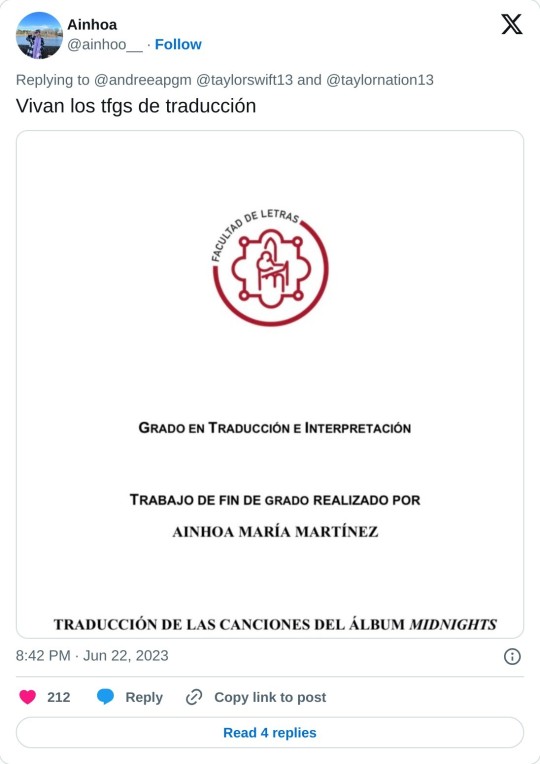
«Lesbian subtext and symbology in the lyrics of Taylor Swift's albums in relation to poems by Emily Dickinson» by Raquel López Romero.
Language: Spanish.
Link and image:

«Examining the influence of the Romanticism movement on the works of Taylor Swift» by Inayah.
Language: English
Link and image:
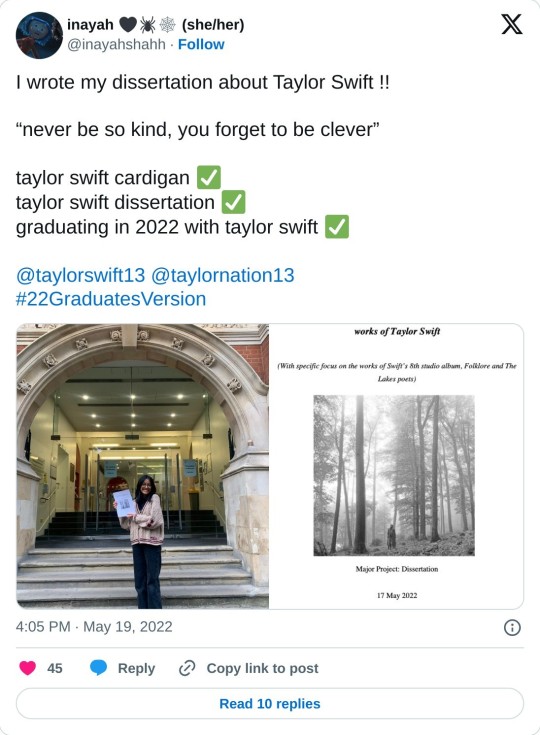
«How the lyrical trajectory of Taylor Swift's songs parallels the development of feminist discourse in popular culture» by Jenny Medlicott
Language: English
Link and image: (not working because the author limits the views)
https://twitter.com/JennyMedlicott
«You Need to Calm Down: An Analysis of Attitudes Towards Women's Anger and the Role This Plays in Discouraging Political Expression in the Case of Taylor Swift» by Sarah Quinn
Language: English
Link and image:

«Look what you made me do: a study of the individualized fan culture of Filipini Taylor Swift's fans» by Katherine Joy Victorio Tolentino
Language: English
Link and image:
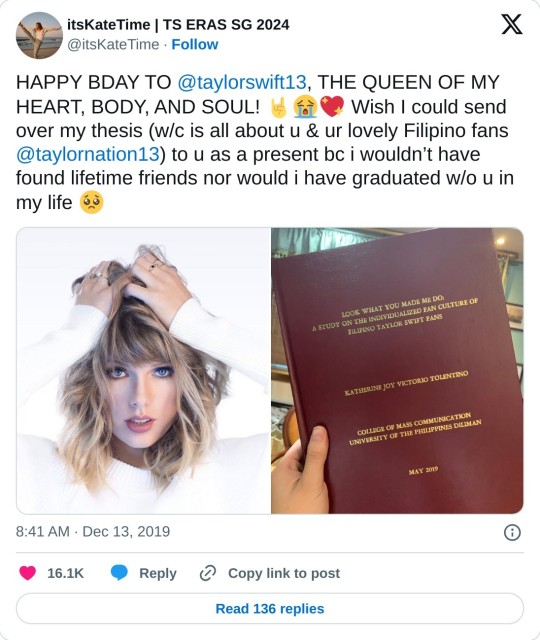
«Marketing strategy in the music industry in the era of social networks: the case of Taylor Swift» by Lisa Sioli
Language: Italian
Link and image:
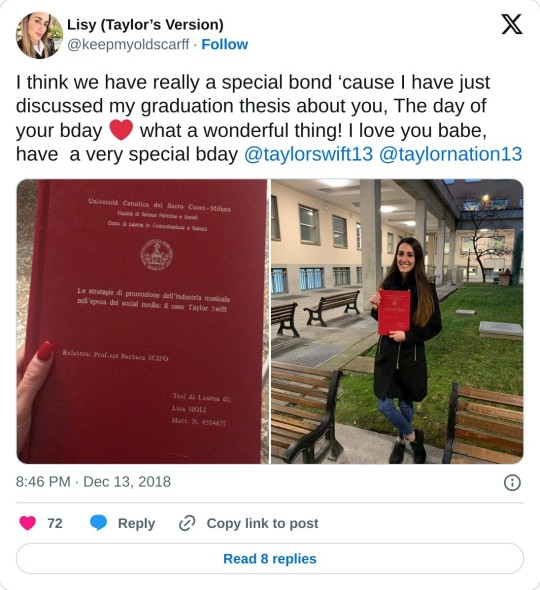
«The art of immersive storytelling in Taylor Swift and F. Scott Fitzgerald» by Joanne Waeber
Language: English
Link and image:
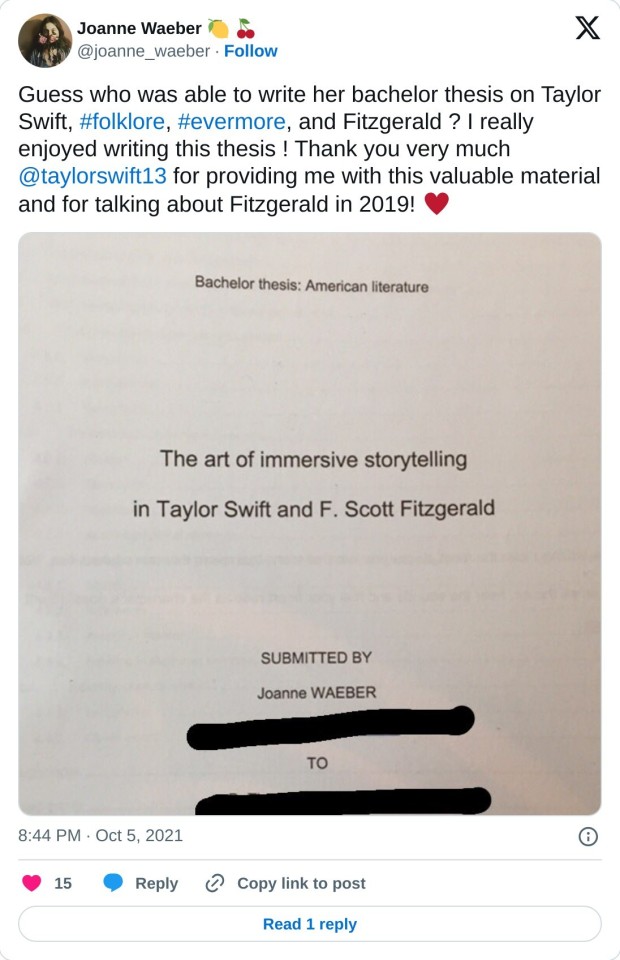
«Look what you made me do: Swift's negotiations with an inherently sexist music industry» by Evie Chiles
Language: English
Link and image:
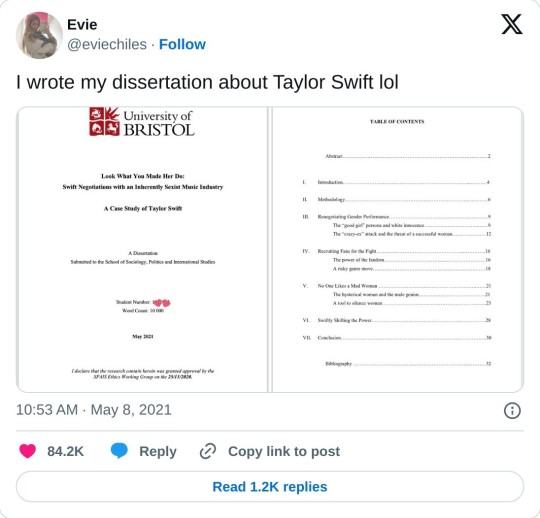
«Love metaphors in the lyrics of Taylor Swift» by Ewa Lawrukiewicz
Language: Polish
Link and image:

«I don't give a damn about my bad reputation: Analysis of the Branding, Performance and Pop Stars as defined texts found within Taylor Swift's reputation» by Mathew Panneton
Language: English
Link and image:
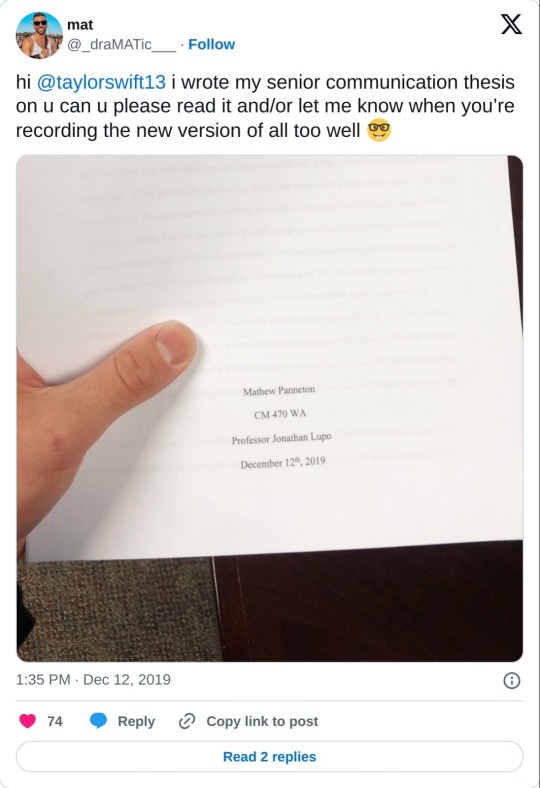
«An Analysis of Meaning and Diction of Taylor Swift on the Red Album» by Rama Darmawan
Language: English
Link and image:

«Taylor Swift and Swifties: Understanding para-social relationships within the fandom» by Lucy Olivia Hewitt
Language: English
Link and image:

«Swifties and social media: the role of social media in Taylor Swift's relationship with fans» by Loren Wright
Language: English
Link and image:
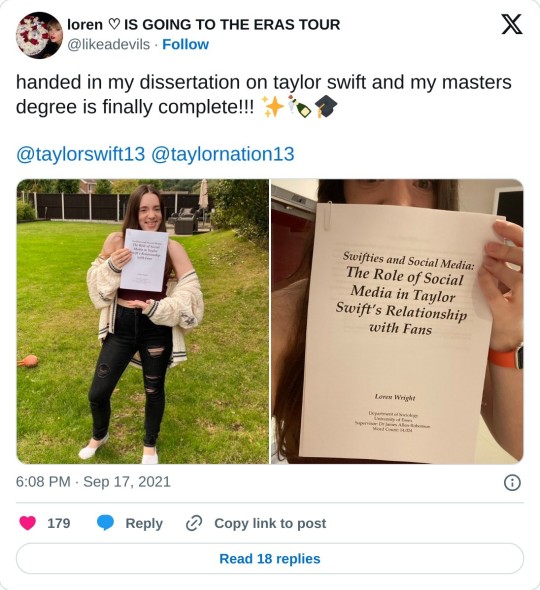
«Femininity Representation and Feminist Discourse: A Case Study of Blank Space Music Video by Taylor Swift» by Tian Hong
Language: English
Link:
«Celebrity, Music, and Public Persona: A Case Study of Taylor Swift» by Elaina K.M. Junes
Language: English
Link:
«Passed down like folk songs: an analysis of story and character in Taylor Swift's folklore and evermore» by Liv Shaw
Language: English
Link:
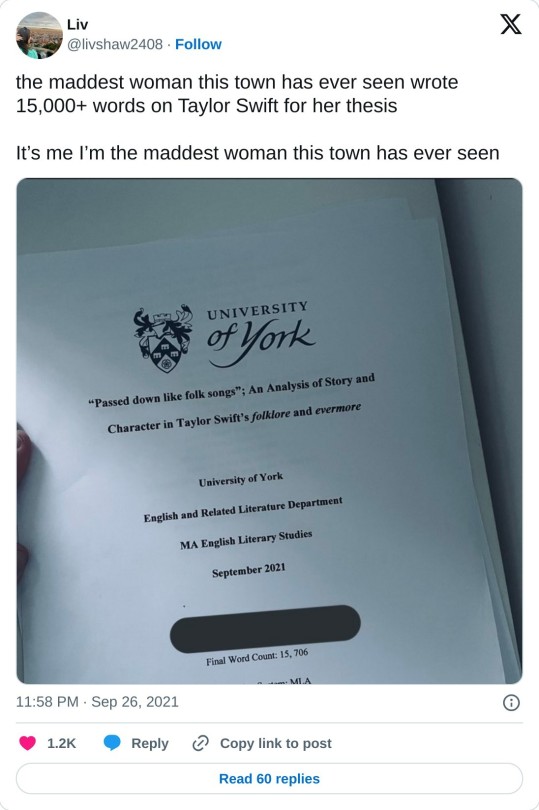
This one I couldn't find the author just the picture on twitter
«'It's A Love Story'-Defining a 'Swiftie' and how Taylor Swift and her Fan Community Reform the Parasocial Relationship On Tumblr» by Chloe on Bachelor of Media

2 notes
·
View notes
Text
Microplastics: A Macro Problem for Our Planet

Source :
Author: Chelsea Rochman
Published in: TED-Ed
Publication Date: July 2018
URL: Watch the video on TED-Ed
Microplastics, which are plastic particles with a size smaller than 5mm, have emerged as a significant environmental concern on a global scale. The presence of these minute contaminants is widespread across our environment, presenting substantial risks to ecosystems, animals, and human well-being. This blog post aims to provide an in-depth analysis of microplastics, including their origins, consequences, and potential strategies for addressing this escalating issue.
The Origins of Microplastics: Microplastics are ubiquitously present rather than being a distant concern. The origins of these may be diverse, including a range of sources, such as:
a. Primary Microplastics: These refer to deliberately produced minuscule plastic particles that are present in various items such as exfoliating scrubs, cosmetics, and industrial abrasives.
Secondary microplastics are generated when bigger plastic objects, such as bottles, bags, and packaging, undergo degradation due to environmental elements including sunshine, wind, and waves.
The Ecological Implications:
The presence of microplastics in the environment has been shown to have extensive and adverse consequences.
Marine Life: Aquatic creatures, ranging from microscopic plankton to large marine mammals such as whales, have the capacity to consume microplastics. This ingestion may result in the buildup of toxic substances inside their bodies, potentially causing detrimental effects on whole ecosystems.
b. Terrestrial Ecosystems: Microplastics have the ability to penetrate terrestrial habitats, so exerting an influence on soil health and possibly causing repercussions for agricultural output.
Human health concerns: The ramifications of microplastic contamination extend beyond the boundaries of aquatic environments. These minuscule particles have the potential to enter the food chain and eventually be absorbed by our bodies, so giving rise to worries about human health. In this discourse, we will examine the prospective hazards and the present status of scholarly enquiry.
Addressing the Microplastic Menace: There are measures that may be used to alleviate the issue of microplastic contamination. The following items are included:
a. Mitigating the Impact of Single-Use Plastics: Through the implementation of measures aimed at lowering the manufacturing and utilisation of single-use plastics, it is possible to effectively address the principal origin of microplastic pollution.
b. Microplastic Filtration Technologies: Novel filtration and waste management technologies have the potential to effectively extract microplastics from water sources prior to their release into the ecosystem.
Consumer awareness plays a crucial role in fostering behavioural change by imparting knowledge to the public on the origins and ramifications of microplastic pollution.
This section will examine worldwide efforts and legislative measures implemented to tackle the microplastic problem. This include efforts undertaken by governmental entities, non-governmental organisations (NGOs), and prominent figures across various industries.
The Progression Ahead: As our comprehension of microplastics expands, our capacity to address this issue also increases. This paper aims to investigate the prospective solutions and breakthroughs in research and technology that provide promising prospects for achieving a more environmentally sustainable and improved global ecosystem.
In conclusion, the presence of microplastics in the environment is a widespread concern that necessitates our focused attention and collaborative efforts. Through a comprehensive comprehension of the origins, ramifications, and prospective remedies, it is possible to undertake measures aimed at mitigating the influence exerted by these minute but consequential contaminants. The urgent need to confront the overarching issue of microplastics is paramount in ensuring the environmental sustainability of our planet and safeguarding the welfare of future generations.
2 notes
·
View notes